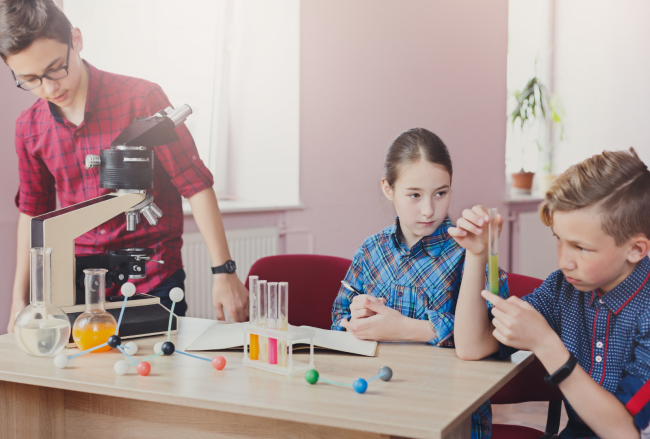Teaching kids about science and engineering can be difficult these days. With things like phones, chewing gum and laptops providing constant distractions – it can be hard to get kids to engage, especially in STEM subjects like math and science.
This is why we’ve come up with 5 strategies to help teachers get children to focus on the subject at hand.
1. Working Together
The move to online learning during the pandemic has led educators to understand the importance of a key part of the learning process – cooperation.
Cooperation is a teaching method in which a small group of students work together on a task. The task can be anything from writing a short story to constructing a renewable energy-powered RC car.
Promoting this collaboration among students enables students with different learning styles and abilities to work collaboratively and help maximize each other's potential. If they work together on a problem that requires lots of different skills to solve, students with different skill sets can learn from each other. This is where traditional STEM education can become STEAM education, with students interested in the arts and humanities interacting with those interested in STEM subjects. In this way, it also encourages students to mutually support one another and develop a sense of joint responsibility.

2. Visualization
Visualization is the ability to "see things in our head'" and create mental images from words we hear or text we read. This strategy can greatly improve student focus and comprehension of a subject or concept. The main benefits are bringing learning to life and helping students make connections to the real world.
To implement this technique in the classroom, you could consider the following methods:
- Using audio-visual aids such as photos, videos, audio clips, and songs
- Deploying diagrams, charts, and mind maps
- Representing the lesson plan in a visual way, so students can make sense of a topic via a diagram
3. Inquiry-based instruction.
Inquiry-based instruction is an approach to education based on students asking questions. The teacher, rather than telling students the answers directly, gently guides students through questions asked. If students are learning about how a hydrogen generator works, for instance, the teacher might ask them what role a certain part of the unit has in making the system run. While this method of teaching has its roots in humanities education, it can also be applied to STEAM education, with teachers allowing students to think about methods designed and data collected. Through inquiry, students actively discover information and take ownership of their own learning.
4. Using Technology to your Advantage
There’s often a misconception that technology in the classroom means all students must have laptops and tablets – but there are a variety of ways to engage students with technology. Integrating even simple technologies like power points, internet homework and online games can really make a difference in levels of student engagement. This also can create pathways for differentiated instruction to meet the unique needs of individual students, who may be at different levels of understanding and comprehension of a topic.
5. Differentiated Instruction
Every classroom is a busy, active and engaged space with students of varied learning styles and abilities.
Understanding that students with different abilities need to be catered for is at the heart of differentiated instruction. While all students may be in a single classroom, each will have different starting points in their learning process.
Where differentiated instruction comes into play is creating individualized content for each student's needs and abilities. For example, in a class about hydrogen energy, the teacher might divide the class into two or three groups each with a different task. While one group might think about how hydrogen can be decarbonized, and other might think about how it can be applied in different industrial settings. The two groups may also receive different tools for assessment.
This addresses the diversity of learning experiences and engages all students regardless of their ability and individuality.